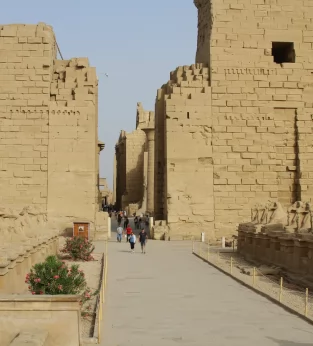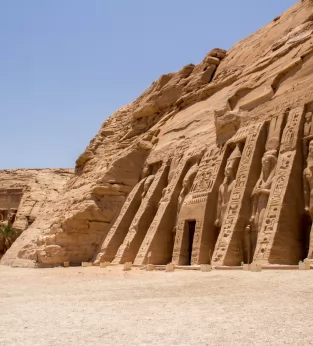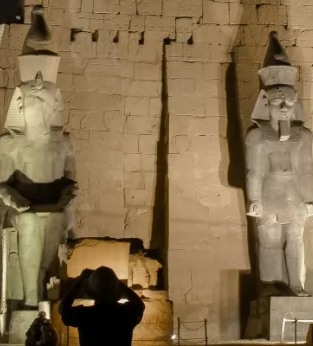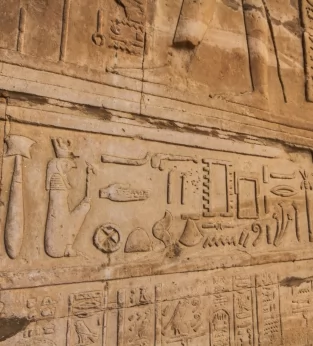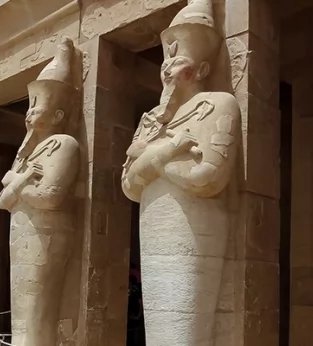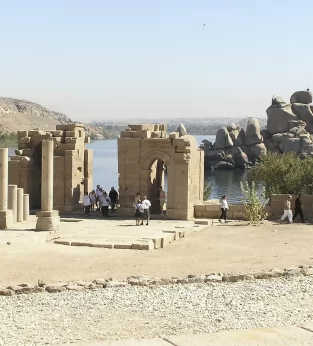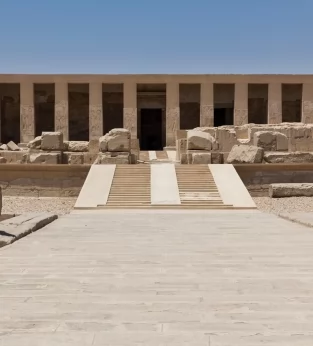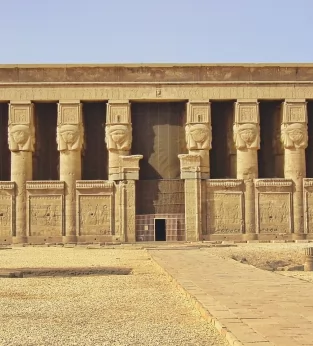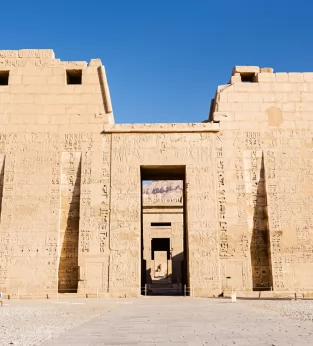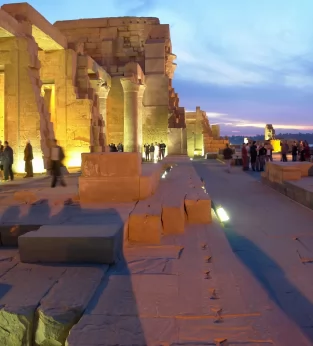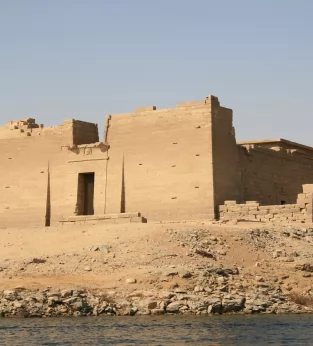Qasr Qarun, also known as the Qarun Palace, is one of Fayoum’s most important archaeological treasures and a remarkable example of ancient Egyptian architecture and devotion. Located near the modern village of Qarun, this temple once stood at the center of the ancient town of Dionysias, founded in the 3rd century BC. Dionysias was a thriving communication hub, marking the start of the caravan route to the Bahariya Oasis. While few of the town’s structures remain, including traces of Roman baths and villas, the Qasr Qarun temple survives almost intact, offering an extraordinary glimpse into Egypt’s rich past.
Constructed from large blocks of yellow limestone, the temple appears plain and box-like from the outside. Yet, beyond its modest façade lies a maze of narrow corridors, staircases, and small chambers spread over several levels. This complex interior reflects both the architectural mastery and the sacred purpose of the temple. Dedicated to the powerful god Sobek-Ra, a fusion of the crocodile deity Sobek and the solar god Ra, the temple once hosted ceremonies conducted by priests in its numerous rooms and rooftop chapels, where the worship of the sun was a daily ritual.
Each year on December 21, Qasr Qarun becomes the site of an extraordinary natural event, the sun alignment phenomenon. On this day, sunlight penetrates deep into the sanctuary, illuminating the Holy of Holies, or Quds el-Aqdas, in a breathtaking spectacle that marks the winter solstice. This phenomenon, shared with other ancient temples across Egypt, showcases the builders’ remarkable astronomical knowledge and spiritual precision. From the roof, visitors can take in panoramic views of the desert landscape and the ruins of the ancient city stretching toward the horizon.
Inside Egypt’s exclusive tours invite travelers to experience the magic of the Qarun Palace up close, guided by expert Egyptologists who reveal its hidden stories and cultural importance. Exploring its labyrinthine passageways, learning about its divine symbolism, and capturing unforgettable Qasr Qarun photos, visitors gain a deeper appreciation for this extraordinary site. A journey to Qasr Qarun is more than a visit. It’s a step back in time to the spiritual and administrative heart of ancient Fayoum.
Want to step inside? Book your luxury Egypt tour!
Photos of Qasr Qarun Temple
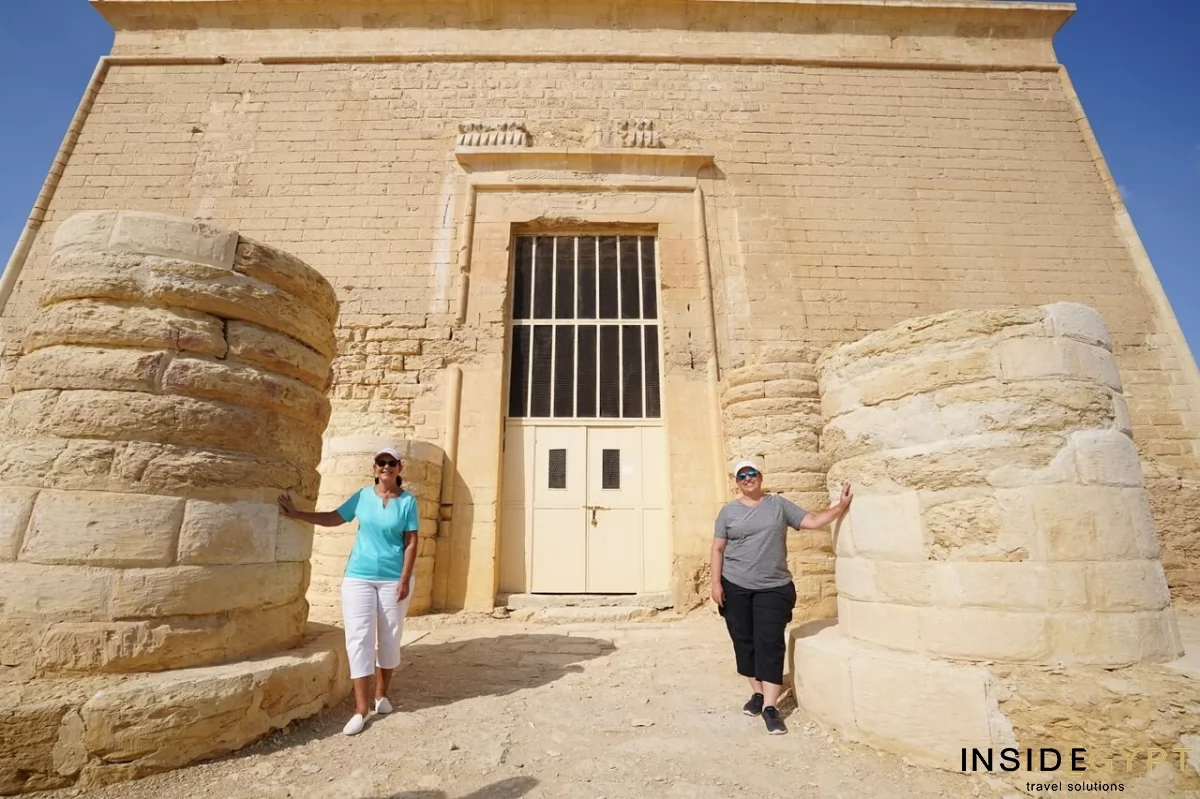
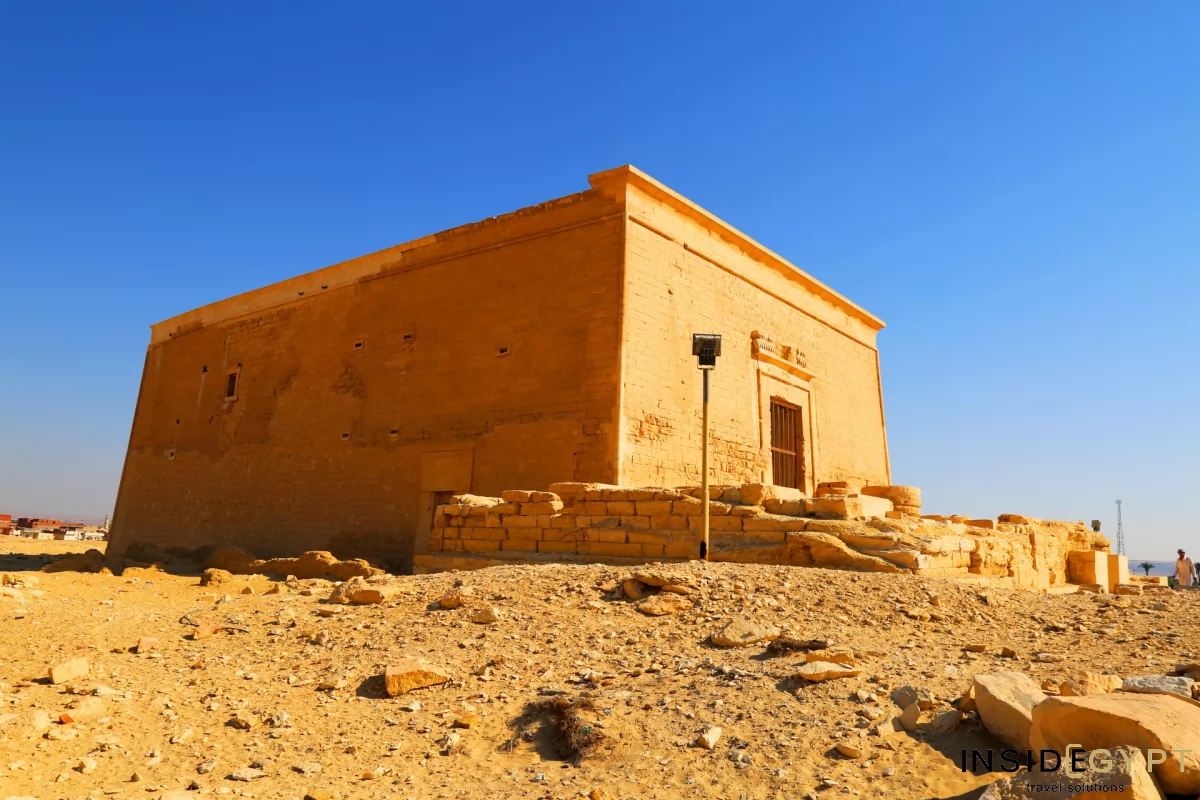
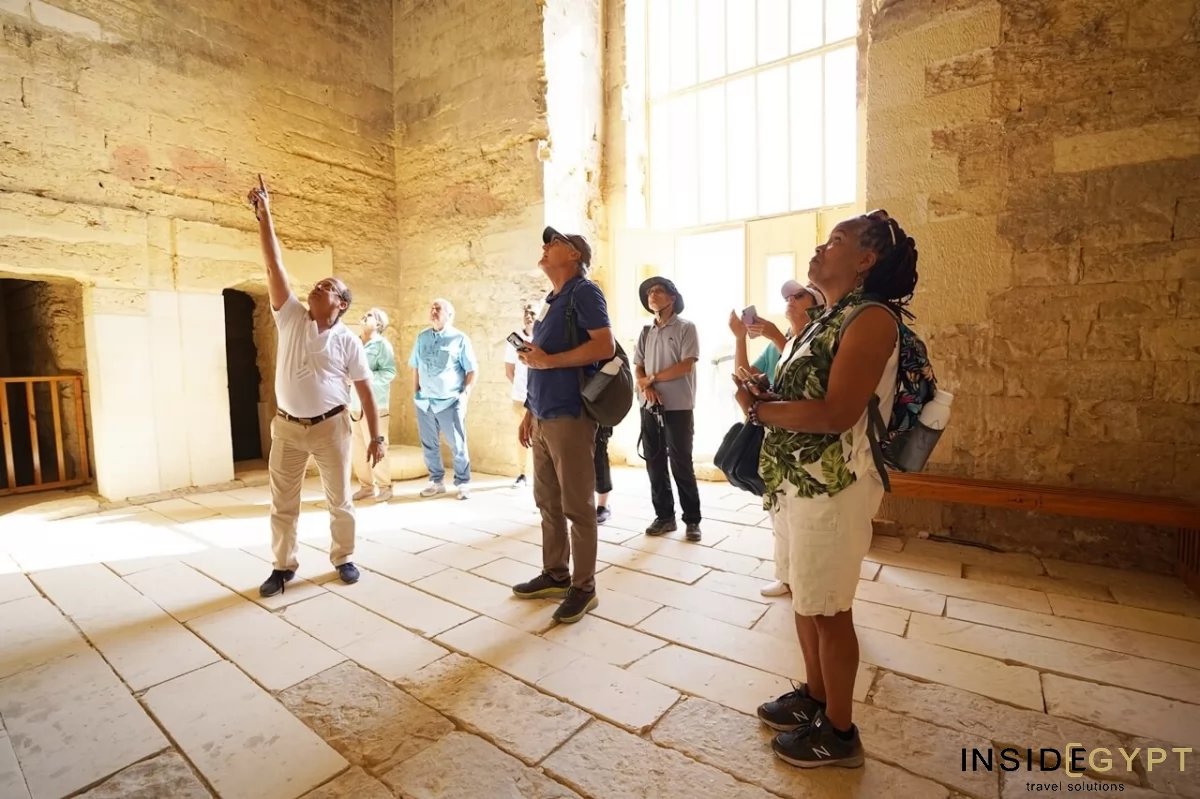
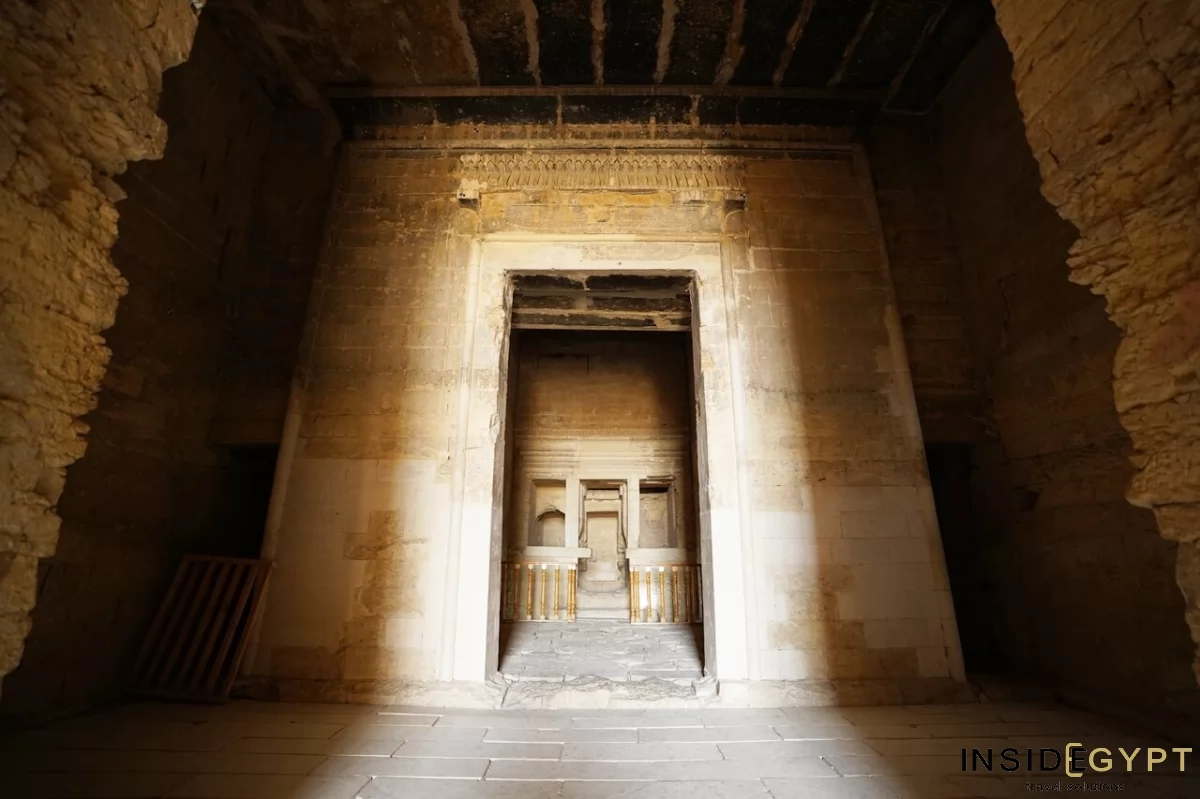
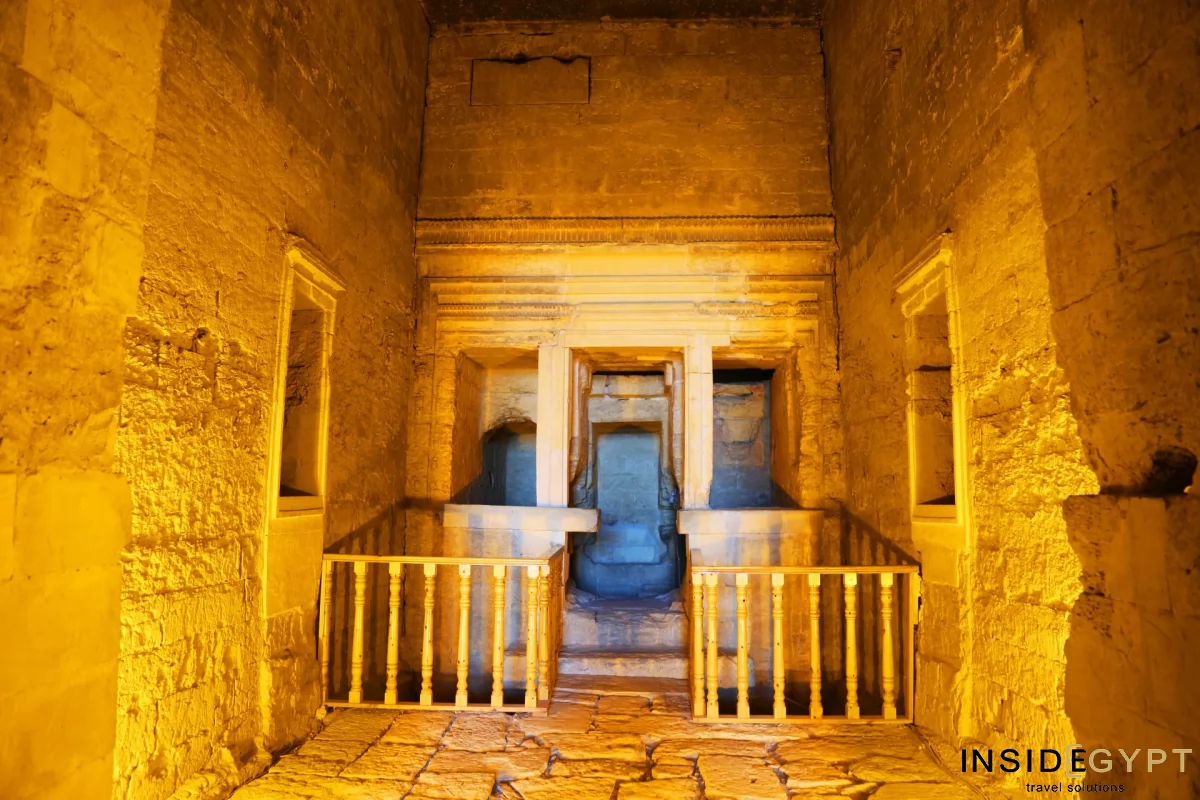
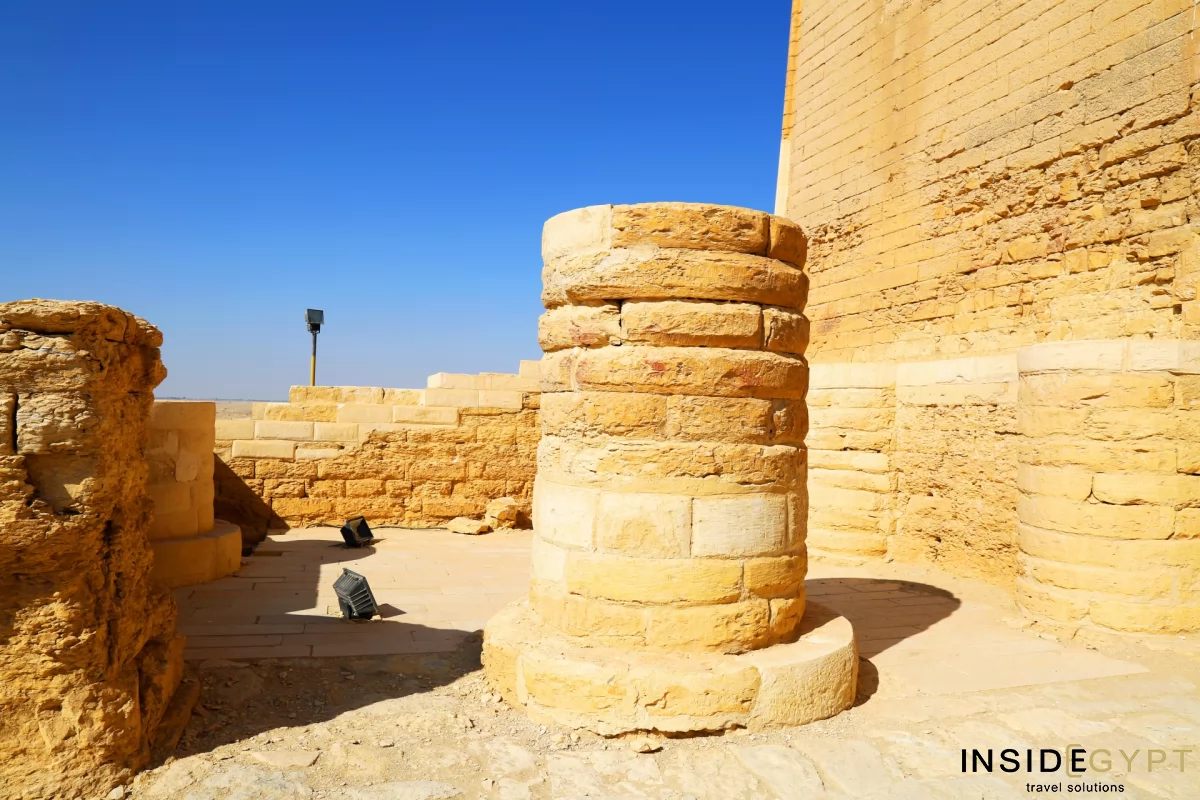
Discover Our Exclusive Egypt Tours
Tour Reviews
FAQ About Visiting Qasr Qarun
What is the significance of Qasr Qarun?
Qasr Qarun holds great historical and cultural significance as both a Ptolemaic temple and an administrative center in ancient Fayoum. Dedicated to the crocodile god Sobek, the temple reflects the deep spiritual traditions of the region during Egypt’s Greco-Roman period. Its strategic position near Birket Qarun (also known as Qarun Lake) underscores the importance of the lake as a vital source of water, supporting agriculture, fishing, and trade routes that connected Fayoum with other parts of Egypt. Qasr Qarun was not only a place of worship but also a hub of economic and civic activity, illustrating how religion and daily life were closely intertwined in ancient society. Today, the temple provides valuable insight into the architectural achievements, administrative organization, and spiritual beliefs that shaped the Ptolemaic era, making it one of the most significant monuments in the Fayoum region.
Who built the complex and when?
The Temple of Qasr Qarun was built during the reign of Ptolemy II Philadelphus in the 3rd century BCE, a time when Egypt was under Greek rule during the Ptolemaic dynasty. This impressive structure reflects a remarkable fusion of traditional Egyptian religious design and Ptolemaic architectural elements, symbolizing the cultural continuity and adaptation that defined the era. The temple was dedicated to the crocodile god Sobek-Ra, a deity deeply associated with fertility, water, and protection. Its massive limestone blocks, labyrinthine corridors, and rooftop chapels exemplify both the engineering skill and spiritual devotion of the builders. The temple stands as a testament to the harmonious blend of Egyptian and Greek influences, preserving the legacy of ancient worship while demonstrating the Ptolemies’ respect for and integration with long-standing local traditions.
Where is Qasr Qarun located?
Qasr Qarun is located on the western edge of Lake Qarun in Egypt’s Fayoum Governorate, about 44 km (27 miles) from the city of Fayoum and 130 km (80 miles) southwest of Cairo. Overlooking the tranquil waters of Birket Qarun, this site once marked an important settlement during the Ptolemaic period, serving as both a center of worship and regional administration. Its strategic position at the lake’s edge made it a hub for agriculture, fishing, and trade, as the fertile lands around the lake sustained local communities and connected Fayoum to broader economic networks across ancient Egypt. The temple’s placement also had religious significance, linking the worship of the crocodile god Sobek to the life-giving waters of Qarun Lake.
How can I visit Qasr Qarun, and when’s the best time?
To visit Qasr Qarun, travelers can easily reach the site by car or through organized tours from Cairo or Fayoum city. The temple is located about 130 km southwest of Cairo and 44 km from Fayoum, making it an ideal day trip destination. Those driving can follow the Fayoum Desert Road, which offers scenic views of the countryside and Birket Qarun (Lake Qarun) along the way. The best time to explore Qasr Qarun is between October and April, when temperatures are cooler and the weather is perfect for walking around the open-air site. Joining a guided tour with Inside Egypt ensures a smooth, informative experience - all logistics are handled, and expert Egyptologists provide fascinating insights into the temple’s history, architecture, and spiritual meaning.
Is there anything to do near the Qarun Palace?
A visit to the Qarun Palace can easily be combined with exploring other spectacular attractions in the Fayoum region. Just nearby lies Lake Qarun, a serene natural haven famous for its birdwatching, fishing, and stunning desert scenery — a perfect place to capture memorable Qasr Qarun photos. Not far away, the Wadi El-Rayan Protected Area offers Egypt’s only waterfalls and breathtaking desert landscapes ideal for nature lovers. For history and paleontology enthusiasts, Wadi Hitan (the Valley of the Whales), a UNESCO World Heritage Site, reveals fossilized remains of early whales, offering a fascinating glimpse into Earth’s ancient past. Travelers can also visit the Magic Lake of Fayoum, known for its changing colors, and the Fayoum Pottery School in Tunis Village, where local artisans create beautiful ceramics. Combining the Qasr Qarun temple with these nearby sites makes for an unforgettable cultural and natural adventure in Egypt’s timeless oasis.
Discover Our Exclusive Egypt Tours
Inside Egypt tours offer a personalized, small-group experience with expert guides and VIP access to Egypt’s top sites. The 14-Day Egypt Tour includes a visit to the Fayoum Oasis and the impressive temple, where travelers explore ancient chambers and enjoy stunning desert and lake views.
Here are our exclusive tour packages:
- 17-Day Egypt Trip – an extended adventure with a luxury Nile cruise
- 15-Day Egypt Tour – explore Egypt & the Siwa Oasis
- 14-Day Egypt Tour – includes Fayoum Oasis & Qasr Qarun Temple
- 12-Day Luxury Dahabiya Nile Cruise
- 10-Day Egypt Tour – highlights of ancient Egypt & cultural treasures
- 8-Day Egypt Tour – the essence of Egypt
- 7-Day Egypt Total Solar Eclipse Tour
Join Inside Egypt for a one-of-a-kind journey where luxury, history, and authenticity come together in every detail.
What People Say About Our Qasr Qarun Tours
Travelers who joined Inside Egypt’s Qasr Qarun tours describe the journey from Cairo to Fayoum as an authentic and inspiring Egyptian experience. From stunning desert views to the timeless temple, every moment reveals the country’s rich history and natural beauty. Here’s what our guests say:
- Our trip from Cairo to Fayoum and the temple with Inside Egypt was unforgettable. The desert landscapes and lush palm groves were breathtaking, and standing before the ancient temple felt like stepping back in time. Our knowledgeable guide brought its history to life, and peaceful moments by Lake Qarun added to the magic. The Inside Egypt team managed every detail flawlessly, making this one of the most memorable cultural experiences in Egypt.
- Exploring Qarun Palace with Inside Egypt was an incredible experience. The journey from Cairo was comfortable and scenic, passing through charming villages and green groves. The Qasr Qarun Temple itself was amazing — a masterpiece of ancient architecture and spiritual energy. Our guide’s passion and expertise made history come alive as we wandered through its mysterious rooms and stairways. Afterward, we relaxed by Lake Qarun, surrounded by desert beauty and endless tranquility. The Inside Egypt team went above and beyond to make us feel welcome, ensuring a smooth, educational, and inspiring adventure that we will always treasure.
- From Cairo, the journey offered stunning desert views, graceful palms, and olive groves leading to Fayoum’s heart. The Qasr Qarun Temple was a true highlight, its ancient corridors filled with history and mystery. Standing on the roof and gazing over the desert and Lake Qarun was magical. Our Egyptologist guide shared fascinating insights, and Inside Egypt’s professionalism and hospitality made this an unforgettable journey through Egypt’s timeless beauty and history.
Each of these reviews reflects the same truth, Inside Egypt’s Qasr Qarun tours offer far more than sightseeing. They provide a deeper connection with Egypt’s heritage, landscapes, and people, leaving every traveler with memories to last a lifetime.
